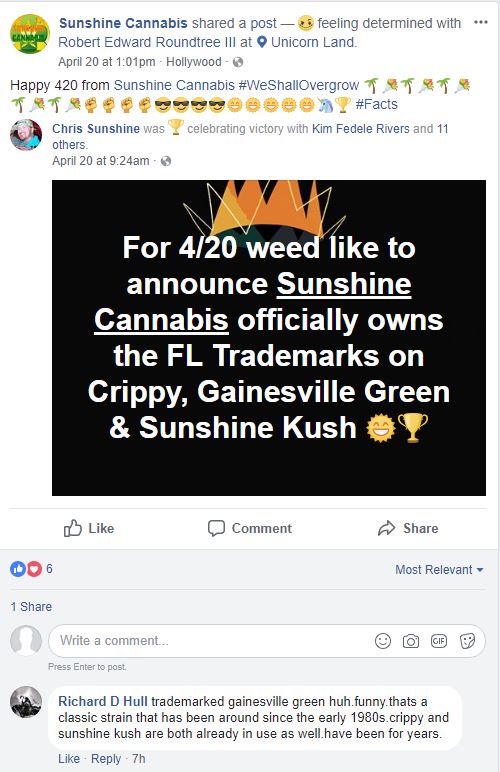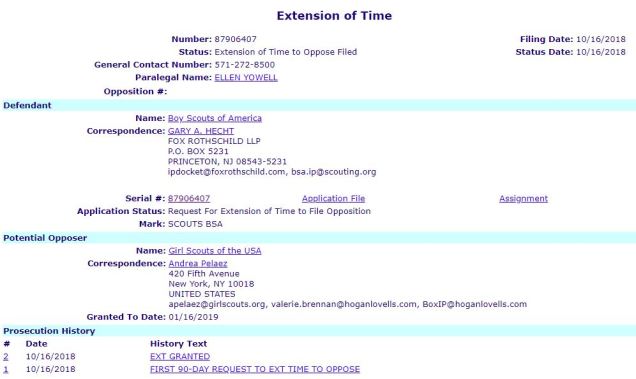Yesterday I wrote about the “legend” of MYAKKA GOLD and how old brands can unexpectedly reappear. Today, I learned that another Floridian has reached back to claim rights to yet another “legendary” brand. This time, it’s CRIPPY.
Yes, that “crippy.” The “crippy” that the highly-respected Urban Dictionary has defined as “High quality grade Marijuana, usually from Florida.” The “Crippy” that Pitbull described in his 2007 “Sticky Icky” treatise as “I need that sticky icky, that Miami crippy; That Washington high purple, watch out that thang will hurt you.” No matter your definition source, “crippy” has for years been considered a “Florida thing” – sometimes as a synonym for “dank” cannabis and sometimes as the name of a specific strain, but in both instances, it’s something originating in Florida.
Despite this pedigree, a Florida-based applicant has recently scored Florida state trademark registrations for:
SUNSHINE CANNABIS – CONSULTING, PATIENT EDUCATION & ADVOCACY SERVICES IN ALL ASPECTS OF THE LEGAL FLORIDA MEDICAL CANNABIS INDUSTRY
SUNSHINE HAZE – (According to Sunbiz’s record detail, the registration covers “A UNIQUE MEDICAL CANNABIS VARIETY.” However, the application actually claims: “A unique Medical Cannabis variety, and preparation thereof for vaporizing or other means of Medical usage by Florida Cannabis patients containing Cannabinoids, Terpenes, Oil, Flowers, Leafs, Stems, and all plant parts or derivatives thereof as permitted under Florida law.”)
SUNSHINE KUSH – (According to Sunbiz’s record detail, the registration covers “A UNIQUE MEDICAL CANNABIS VARIETY.” However, the application actually claims: “A unique Medical Cannabis variety, and preparation thereof for vaporizing or other means of Medical usage by Florida Cannabis patients containing Cannabinoids, Terpenes, Oil, Flowers, Leafs, Stems, and all plant parts or derivatives thereof as permitted under Florida law.”)
TRIANGLE KUSH – (According to Sunbiz’s record detail, the registration covers “A UNIQUE MEDICAL CANNABIS VARIETY.” Application not available.)
GAINESVILLE GREEN – (According to Sunbiz’s record detail, the registration covers “A UNIQUE MEDICAL CANNABIS VARIETY.” Application not available.)
CRIPPY – (According to Sunbiz’s record detail, the registration covers “A UNIQUE MEDICAL CANNABIS VARIETY.” Application not available.)
The applicant even proudly posted this (and who can blame them, it is certainly a victory worth celebrating):

Since this post is focused on CRIPPY, let’s look at that registration. It indicates that the mark was first used with a “unique medical cannabis variety” on December 13, 2013. Why is that date important? Well, it establishes the priority date for the trademark owner so that if anyone was selling similar goods with a similar name prior to that date, they would have senior rights. Florida’s low-THC “Charlotte’s Web” law wasn’t even on the books in 2013, so I am not clear on how the CRIPPY applicant actually used the mark in commerce in 2013. At the federal level, a “use in commerce” must be a lawful use (thus the current inability to register many cannabis marks via the United States Patent and Trademark Office). See, e.g., FN Herstal SA v. Clyde Armory Inc., 838 F.3d 1071, 1086-88 (11th Cir. 2016) (discussing lawful use requirement for federal registration).
So, would a 2013 sale of CRIPPY in Florida be a lawful use? Does Florida’s trademark statute even have a lawful use requirement? Was there a medical cannabis variety in Florida named CRIPPY in 2013? Those answers are very relevant to the viability and enforceability of these registrations.
I know nothing about this applicant, and there may very well be some factual scenario that makes these registrations perfectly legitimate. However, from a high-level view, CRIPPY, and perhaps others in the list, have been known cannabis strains since well before 2013. Does that mean someone can’t or shouldn’t try to claim rights to them now that cannabis is a good which can be legally bought and sold in Florida under certain circumstances? Those are tough questions, but trademark registrations are not like amassing domain name registrations where entrepreneurs register domain names for the hope of subsequent sale or use one day. I am not suggesting that this registrant is treating trademarks as such – I’m just using domains as an example of an “IP-ish” asset that can be dormant and still have value. In Florida, to receive a trademark registration, you must be offering the goods or services for sale under the mark before you obtain a registration. There is no “intent to use” path like there is at the federal level. Was this cannabis strain being lawfully sold in Florida in 2013? I don’t know. Regardless, if a licensee or anyone else who might be authorized to sell branded cannabis has the ability, or even the right, to re-purpose legendary strain names into single source-identifying brand names (which is what trademarks do – identify a single source for goods or services), should they?
Is your buddy from college who used to sell you CRIPPY in the 1990’s going to challenge this trademark registration? Of course not, but it shows the mess that is slowly building despite the tightly-controlled vertical-integration model Florida has established.
I wrote this in 2014:
So, what is the Florida-based medical marijuana entrepreneur to do? State trademark registrations are an option, but Florida does not recognize “intent to use” applications like the USPTO does. This means that even if you are planning to open a dispensary, nursery, or other marijuana-related establishment once the regulations are drafted and licenses are issued, you cannot apply for the state trademark registration now because you cannot yet legally run a medical marijuana facility in Florida. The flood of state applications that will occur on Day 1 will be astounding, and anyone who has used Florida’s state registration system knows that this impending flood just might break the system.
While the system might not have broken yet, I do think that we are headed toward increased brand (and registration) tension because of registrations like these, and it’s unclear at this stage if the law, the market, or both will need to step in for a correction.
BONUS CONTENT: I posted that this applicant received state trademark registrations, so why didn’t I use the “circle-R” registered trademark symbol in the title of this post, instead using the “TM” symbol after CRIPPY™? Because only owners of federal trademark registrations can use the circle-R symbol. State registrants are still limited to the “TM” or “SM” symbols, which typically identify “common law” uses when dealing with federal marks.














